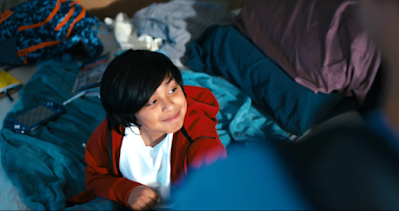unrecognizable
by
Douglas Messerli
Harry
Jenkins (screenplay and director) Harry Jenkins With You, in Our Town / 2024 [14 minutes]
British
director Harry Jenkins’ short film might have been somewhat earth-shattering if
it had been released in 1999 or early in the new millennium, but 24-years later
the fact that a dear friend like Benny (James Leslie) returns home for the
“gap” from the university to find that none of his friends are even
recognizable, particularly his best childhood buddy Tom (Dan Trifunovic) is
hardly surprising.
Benny’s world, in fact, has completely been
altered since he has realized at uni that he is gay, so that now Isaac and
Kevin’s gay jokes sound fairly homophobic, and along with the fact that
basically they are, all four of them, perfectly happy to spend a day playing
football and drinking before they retreat to the local pub with their
girlfriends, events quite literally turn Benny’s stomach.
He sees Isaac as the “classic straight
male into action,” and his continual gay jokes more than a little disturbing.
And then there is Tom, whom—given their childhood closeness—he’s somehow
convinced himself might have become gay, still acting probably like he always
did, as the mindless straight boy he’s always been. Within a few moments after
their pub gathering, Benny heads off home having, as one of them puts it, a
“meltdown.”
How to explain what he’s feeling. Isaac
attempts to explain that just because of his jokes, he’s not a homophobe, but
Benny now sees everything differently. His summary of the situation is at the
heart of this film:
“I
just can’t keep pretending that all the things you say don’t bother me, that
it’s fine, ‘cause it’s not okay. Just so many things have shifted, and, and I’m
so sick of people using words so personal and so conflicting, all for what? To
tease someone, to poke fun all covered up because it’s just banter and it’s all
right and, and who cares and whatever but I care.
I’ve come home and I don’t recognize
anyone. It’s like the faces are the same but the people are gone and there’s
just so much that’s different now and you’re all so blissfully unaware of how
things have…”
There Benny leaves off, realizing what
novelist Thomas Wolfe perceived nearly a century earlier, “You can’t go home
again.”
When Benny walks off, one of the boys
asks, “Do you think he’s….”
Tom interrupts them with his assertive response,
“Yeah.”
Benny’s childhood friend finds him laying in
the grass on an open hill which they obviously regularly visited as kids. Upon
establishing the fact that while he, himself, is sexually wired differently,
Tom lays down next to Benny, assuring him that he’d long had his suspicions,
but that “it” [Benny’s being gay] doesn’t matter, that even his sexual feelings
for him are no problem (who wouldn’t love this beautiful face, he jests). They
are still friends. Things are like they always were between them.
But, of course, they’re not. Everything
has changed, even perhaps the attitudes toward homosexuality of his friends;
this is a far more open group than one might suspect in a small town in which
homosexuality as outlawed until just a few years before these boys’ birth.
It is pretty evident that, except for
occasional visits to his family, that in the future Benny’s return to town will
become briefer and briefer until they will come to an end. And when Tom
marries, surely even that friendship will probably perish.
Given my own inability to travel and the
death of my parents, I doubt I shall ever visit my hometown in Iowa again.
There is nothing except for my brother and his family to draw me back.
There are no revelations or even
surprises, accordingly, in this cinematic narrative, just as there are no
important revelations of LGBT life in Jenkins’ work—except for the fact,
perhaps, that despite the insensitive comments of young men like Isaac and
Kevin, they have perhaps become somewhat more accepting of a gay boy in their
midst. Despite, Benny’s heartfelt and justified speech, what happens in and
around this version of “Our Town,” has also somewhat changed just as it remains
the same. The real changes have all been Benny’s, which is what university
life hopefully results in.
Los
Angeles, July 7, 2025
Reprinted
from My Queer Cinema blog (July 2025).







